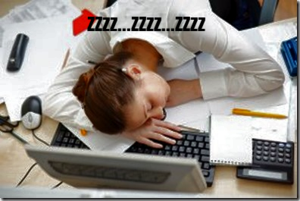
“If you spend too much time thinking about a thing, you'll never get it done.” - Bruce Lee Tweet This Quote!
Please share this post on Twitter, Facebook, or any of your favorite social media sites. We welcome all comments. Thanks!Contributing Author: Sameer Bhatia
In our flailing economy, people are in no position to leave their positions. Let’s face it - if your boss asks you to make him coffee, you get it perking.
If you’re asked to work on the weekend, you cancel the softball game you planned with your pals. If you’re on the schedule for 60 hours, you work 60 hours, if not more.
Fear of losing job security is through the roof, forcing many people to let themselves be overworked.
At what expense, though?
Oh, just health, happiness and family life.
Do the math.
It’s very simple.
Shorter work hours leads to increased productivity, which ends up with more profit for the company.
Overtime destroys this equation because employees get burnt out, tired and physically sick.
Why are there employers that demand overtime? Probably because they don’t realize that they’re actually working against themselves instead of for the company.
Was it always this way?
This is how it’s been for so long that the American public, including managers, don’t realize that overtime is not actually effective.
However...
Before we became an overworked society, people thought that being behind a desk for more than 40 hours a week was dangerous, expensive and simply not worth it.
You know what? They were right.
During the 19th century, unions insisted that their members worked for 40 hours, which was shorter than what most people were working at the time.
At first, management went along with it because they had to, but then they saw their business become more profitable.
How can more work be less productive?
For every hour that’s worked over 40 hours, productivity goes down for both the short-term and the long-term.
The best thing a business can do for themselves is let everybody off the hamster wheel after a full work week so they can recoup and return to work refreshed.
Whether an employee works 15 hours or eight, employers aren’t getting more than a solid eight hours of productivity out of their workers.
That means that paying workers for extra hours is actually wasting money. Plus, the more often workers have to put in overtime, the less effective they are during their normal eight hours because they’re getting increasingly burned out.

Employees do their best work from their second hour through their sixth.
The first hour of the day is usually spent setting up for what lies ahead and the last two hours aren’t nearly as productive as the previous five.
Once a worker reachers their ninth hour, they’re fatigued and dragging their feet, which makes them only work at half capacity at best.
Stop the madness!
Not everyone has a choice when it comes to their work hours.
Those who can set their schedules, though, should remember that pushing their energy to the brink doesn’t prove that they’re passionate and productive. Quality speaks much more than quantity.
Who cares how many hours an employee clocks in each week if they’re accomplishing next to nothing?
But… sometimes overtime is necessary, right?
What happens when a company just needs extra manpower?
Overtime can be useful, as long as it’s in short spurts.
If a goal or quota has to be met before the end of the year or extra work has to be completed to counteract an unexpected problem, it’s worthwhile to have workers on the clock for extra hours - but just for one week.
During the second week, there’ll be a definite decrease in productivity and it will only get worse as time goes on.
Napping, breaks and focus.
Mounting studies further demonstrate that if you are going to work a long day, breaking it up with a nap, a longer lunch break or even some mindless errands can help you focus better when you do work.
Usually, that means getting more done by the end of the day, not just in spite of having taken breaks, but because of it.
Perhaps some people can will themselves through crushing work schedules, but the evidence shows that it very likely isn’t helping them get more done.
Finding balance in the amount of time you actually spend working means that your work time is truly productive and sustainable.
About the Contributing Author:

Sameer Bhatia is the founder of ProProfs.com, which provides the popular software to create an online survey.
Get more updates from Sameer, then follow him on Twitter.
The Woman in Leadership community provides additional business advice for you!
If you enjoyed today's post, then you are going to LOVE the recent posts on Business Advice below:


